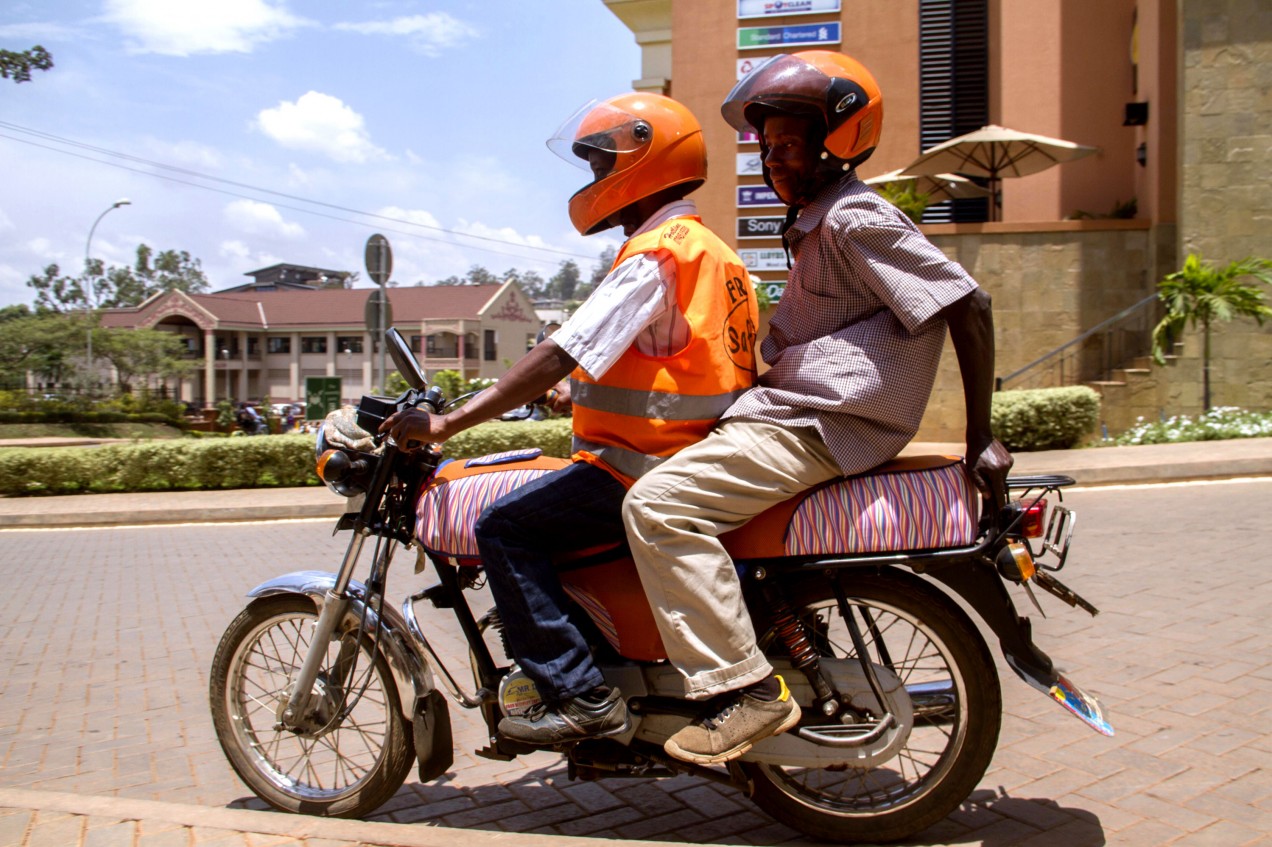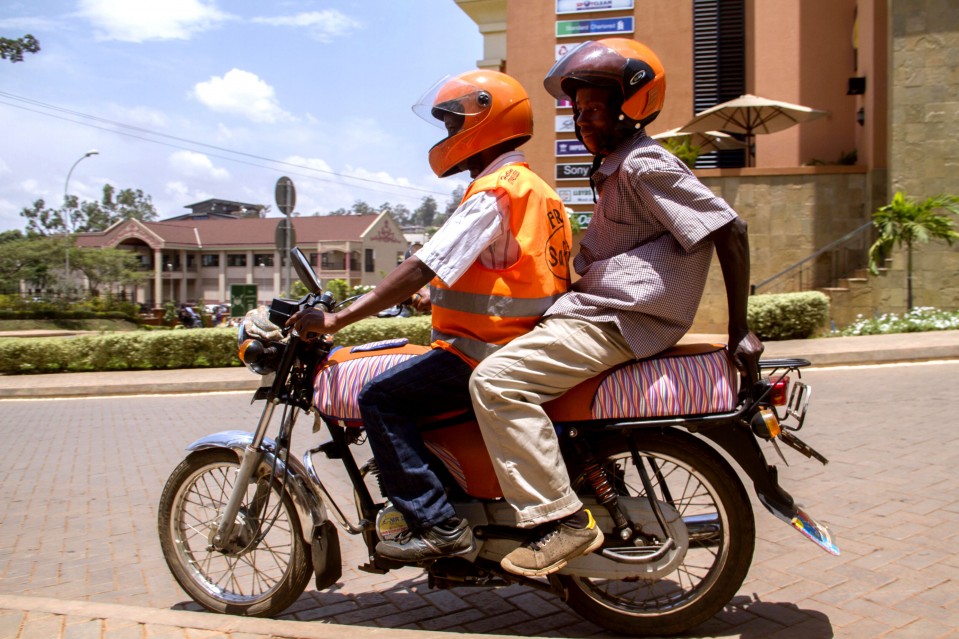

Business Impact
Uganda’s “Uber for Motorcycles” Focuses on Safety
Kampala’s moto-taxis have joined the ride-hailing movement with a promise to address one of its biggest transportation problems.

If I needed to be convinced of the utility of SafeBoda, a ride-hailing app for motorcycle taxis in Uganda’s capital, Kampala, the accident scene I witnessed on my first ride with the service more than did the trick. On a Monday afternoon in March, as I sat on the back of a 110-cc, Indian-manufactured “boda boda,” as moto-taxis here are known, my driver, Abdallah Mawejje, braked as traffic slowed along one of the city’s many exhaust-filled thoroughfares. In the midst of a scrum of pedestrians and idling vehicles, a young man lay motionless on the pavement, bleeding from his head as a passerby tried to drag him to the sidewalk.
“He’s a boda boda driver,” Mawejje confirmed as we maneuvered past, with a tone of indifference that suggested he’d seen this many times before. “That’s why you should avoid these guys. They speed. They overtake vehicles when they shouldn’t. They don’t take care.”
Mawejje, of course, is a boda boda driver himself — one of an estimated 80,000 in this hilly, congested city of 1.5 million people. Yet since he joined the SafeBoda fleet — donning its trademark orange vests and helmets — almost a year ago, he’s undergone a transformation. In addition to taking clients from an Uber-style app, which allows customers to request a pickup, pay for their ride — at a cost similar to that of normal boda boda drivers — and rate their driver on a smartphone, he follows a strict code of conduct, which entails obeying traffic regulations and keeping his bike properly maintained. He’s a Red Cross-certified first responder, has undergone road safety training as part of a partnership with the Ugandan Police, and carries a high-quality helmet for his passengers.
While this may all seem like it should be standard practice, in Kampala safety is typically an afterthought. Boda bodas are popular here due to their low cost and ability to cut through gridlocked traffic, yet only 30 percent of drivers wear helmets and almost none make them available to their clients. Many drivers don’t even have drivers’ licenses, and tales of drivers robbing customers aren’t uncommon. At Mulago, the national referral hospital, an estimated 41 percent of patients admitted to the trauma ward are victims of boda boda accidents.
SafeBoda, founded by entrepreneurs from the U.K., Belgium, and Uganda, has focused on building a strong safety record. When I visited its offices in March, its drivers had gone 80 days without an accident. Since its launch in 2014, it hasn’t recorded a single driver or passenger death. Mawejje, who had previously quit the profession due to its bad reputation, says he now feels more respected. The company, locals say, has established itself as a trusted brand, with drivers whose professionalism far exceeds Kampala standards.
As a business, though, SafeBoda initially struggled. Despite surpassing $1 million in seed capital, and enlisting more than a thousand drivers, the company’s technology was holding it back. Customer uptake was hindered by early version apps its cofounders admit were “crappy,” service that was limited to certain neighborhoods, and the convenience of hopping on a normal boda boda, which are available at nearly every street corner.
Until February, when SafeBoda released an all-new app, designed under the direction of a former engineer from Lyft, only a small fraction of the company’s 15,000 to 20,000 daily rides were conducted through the mobile platform. Instead, most drivers simply hailed clients like normal motorcycle taxi operators. Not only did this render the service unreliable for those actually seeking to use the app; it also deprived the company of a critical source of revenue. In addition to charging drivers a one-time fee of $55 (200,000 Ugandan Shillings) to join, SafeBoda takes a 15 percent per-ride cut of app-booked trips.
Following this technology overhaul, the company’s main task now, says co-CEO Maxime Dieudonné, is to convert as many of its “normal drivers” to “app drivers” as possible, with the immediate aim of completing 1,000 in-app trips per day by mid-May. So far, 100 drivers are available on the new mobile platform; each are provided with a Samsung J2 phone on credit, a custom motorcycle charging device, and a three-day “tech wizard” training to acquaint them with the ride-hailing concept. “Many of them were not familiar with smartphones,” says Moses Musinguzi, a former driver who leads the training. Yet most, he says, are enthusiastic about the new means of connecting with customers.
Smartphone penetration among boda boda passengers, who tend to come from Uganda’s middle classes, is relatively high. Still, convincing clients to use the app remains a challenge. In theory, the mobile platform should make the riding experience more convenient and safer: without it, there’s no guarantee a customer will find one of the company’s safe and vetted drivers in the streets.
With the cost of a typical ride hovering around a dollar, SafeBoda’s revenues will remain slim for the foreseeable future. Over time, however, if the company can grow, both in Kampala and in other African cities on its radar, the concept is financially viable, Dieudonné insists.
Making rides safer will take time, too. Today more than 60 percent of passengers decline to wear SafeBoda’s provided helmets, for example. Some because of concerns over hygiene, others, particularly women, because they don’t want to mess up their hair.
After seeing the ugly side of Kampala’s roads up close, however, I made sure to strap mine on tightly.